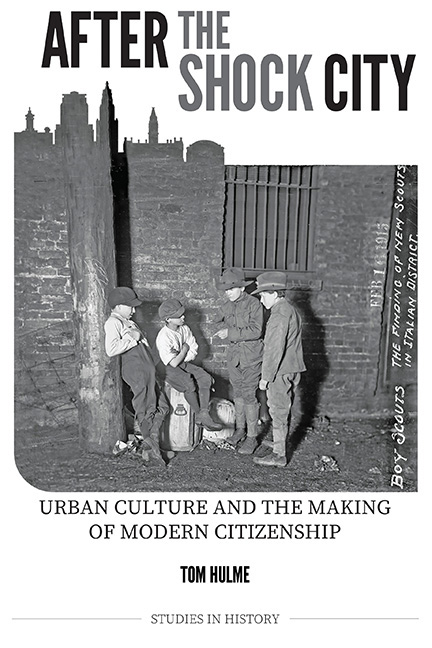Book contents
- Frontmatter
- Dedication
- Contents
- List of figures
- Acknowledgements
- Abbreviations
- Introduction: after the shock city
- 1 Citizenship and the Interwar City
- 2 Urban Utopias and Education
- 3 Celebrating the City
- 4 History, Progress and Community Performance
- 5 The Citizen of Tomorrow
- 6 Civic Culture and Welfare
- Conclusion: after the citizenship city
- Bibliography
- Index
6 - Civic Culture and Welfare
Published online by Cambridge University Press: 03 September 2019
- Frontmatter
- Dedication
- Contents
- List of figures
- Acknowledgements
- Abbreviations
- Introduction: after the shock city
- 1 Citizenship and the Interwar City
- 2 Urban Utopias and Education
- 3 Celebrating the City
- 4 History, Progress and Community Performance
- 5 The Citizen of Tomorrow
- 6 Civic Culture and Welfare
- Conclusion: after the citizenship city
- Bibliography
- Index
Summary
Growing intervention in youth culture reflected wider shifts in how cities and their inhabitants were being governed by the interwar period. In Britain, the early part of the twentieth century saw the consolidation of an increasingly interventionist state with the expansion of government into the ‘social sphere’. Liberal reforms set new standards in areas such as pensions (1908), employment insurance (1911) and schools (1906–7). A few years later the demands of ‘total war’ encouraged more central expansion and socio-economic planning. Interwar legislation grew unevenly, disrupted by economic instability and frequent switches between governing parties, but policy continued to be centralised in new and powerful departments. City councils could consequently find their powers restricted, regulated or taken away entirely – such as with the Unemployment Act in 1934, which created a national system for relief. But the period also saw a last flowering of municipal government. Local councils reached the height of their spending and administrative power, retained most of their municipalised utilities and were encouraged by central aid to enter new areas of social welfare. Signs of the rise of the post-1945 welfare state, then, were apparent – but centralisation was a complex process, and never totally assured.
In the US national myth-making and exceptionalism has often downplayed federal ascendancy. Until relatively recently, according to William Novak, the American past has been seen as one of limited government and an individualist quest for civil, economic and social freedom. The American state however, he argued, has always been ‘more powerful, capacious, tenacious, interventionist, and redistributive’ than commonly believed. The New Deal moment in the mid-1930s, which saw significant social and economic reform across all areas of life, can mask a longer history of state intervention. In the nineteenth century the federal government had frequently acknowledged responsibility for citizens affected by unforeseen disasters and had distributed emergency relief. The First World War also had an unprecedented impact on the expansion of federal government at the local level, as the need to intervene in areas such as ‘enemy alien’ registration, war bond raising and food rationing were central to achieving victory. Before the war, annual federal budgets never reached $800,000,000; during the conflict, expenditure averaged $43,000,000 per day.
- Type
- Chapter
- Information
- After the Shock CityUrban Culture and the Making of Modern Citizenship, pp. 167 - 197Publisher: Boydell & BrewerPrint publication year: 2019



